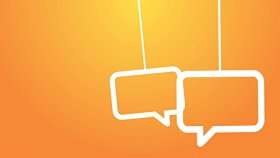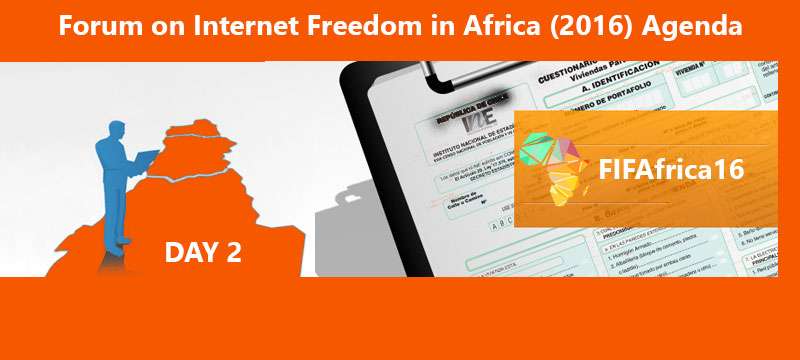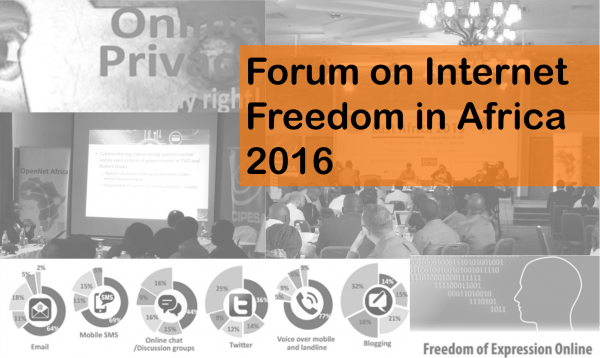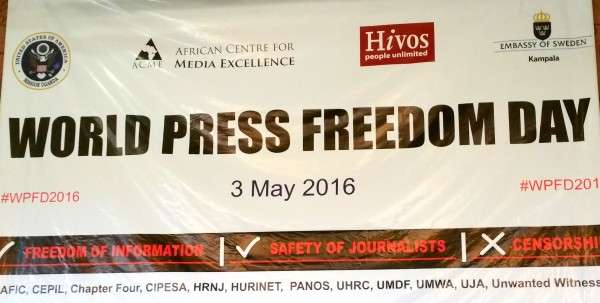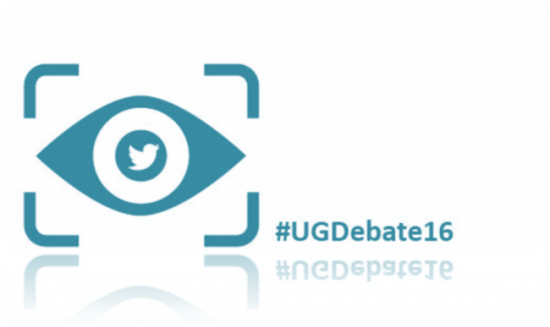By Juliet Nanfuka |
The Collaboration on International ICT Policy for East and Southern Africa (CIPESA) with the support of Facebook, the Ford Foundation, Google, Hivos, Open Technology Fund (OTF) and Small Media will assemble an audience in Kampala, Uganda for the Forum on Internet Freedom in Africa 2016. Set to take place on September 27–29, the Forum has become a crucial convening for actors on online freedom of expression and association, and the free flow of information in Africa.
Panel discussions at this year’s Forum will explore the growing trend of internet shutdowns, the increasing presence of violence against women online, the intersection of open data and human rights, African frameworks that protect online rights and their conflicts with outdated laws, amongst others.
“Recent events across various African countries make the Forum as indispensable as it ever has been in discussing challenges to online rights and the opportunities for collaborative efforts by state and non-state actors to meaningfully protect and advance internet freedom on the continent,” says CIPESA Executive Director Dr. Wairagala Wakabi. “We are glad to be facilitating growing awareness of online rights in Africa and are keen to continue contributing towards building this awareness amongst different stakeholders.”
Indeed, one of the pre events at the Forum will be the training of journalists and human rights defenders on human rights and internet policy. The training will be hosted by CIPESA, together with Paradigm Initiative Nigeria (PIN) and the United Nations Office of the High Commissioner for Human Rights (OHCHR) in Uganda.
The Forum, set to coincide with the International Day for Universal Access to information (September 28), will also serve as an opportunity to delve into the current trends on access to information on the continent. In partnership with the Africa Freedom of Information Center (AFIC) and Office of the Prime Minister (Uganda), a public dialogue on access to information as a driver to achieving the 2030 Development Agenda and the Sustainable Development Goals (SDGs) will also be held.
A key highlight of the Forum since its inception is the launch of the annual State of Internet Freedom in Africa regional reports. Previous editions of this report have focused on seven African countries – Burundi, Ethiopia, Kenya, Rwanda, Tanzania and Uganda – with a stand-alone report produced on South Africa. This year’s report has been expanded to include 10 countries. The countries featured in the 2016 State of Internet Freedom in Africa report are Burundi, Democratic Republic of Congo, Ethiopia, Kenya, Rwanda, Somalia, South Sudan, Tanzania, Uganda, Zambia and Zimbabwe.
Dr. Wakabi adds, “Access to information and the state of internet freedom are closely interlinked. Countries with higher levels of information access tend to have more online liberties than those without, and they also generally have a healthier democratic culture. The power of public information, open data and a free and open internet should not be undermined if we are to achieve effective civic participation, respect for human rights, transparent, accountable and democratic governance, and realisation of the 2030 Development Agenda.”
The Forum serves as an opportunity to gather insights from the different stakeholders in the information society ecosystem towards promoting a free and safe internet, hence the key themes that emerge from the Forum are widely disseminated. The 2015 outcomes and recommendations were shared in spaces such as the Internet Governance Forum (Brazil), the Africa IGF (Cameroon) and the Stockholm Internet Forum, and in various national convenings.
The Forum has confirmed participants from at least 23 countries and speakers from over 46 organisations including the Berkman Klein Center for Internet & Society at Harvard Law School, Panos Institute Southern Africa, BudgIT (Nigeria), Article 19 (Kenya), Digital Society of Zimbabwe, the Web Foundation, Association for Progressive Communications (APC), iAfrikan, Namibia Broadcasting Corporation (NBC), Access Now, Kenya ICT Action Network (KICTANET), National Information Technology Agency (NITA) Ghana, and Research ICT Africa. Others include Hivos, Nation Media Group, Africa Media Institute, Media Institute of Southern Africa Zimbabwe Chapter, Freedom of Expression Institute (FXI), Privacy International (PI) , Uganda Police, Zambia Police Service, University of Malawi, Communications Regulators Association of Southern Africa (CRASA) and the Ministry of Information, Communications and National Guidance (Uganda).
Follow the conversation at #FIFAfrica16.
#FIFAfrica16: Agenda – Day 2
#FIFAfrica16 | See what we have lined up for the Forum on Internet Freedom in Africa 2016. On 29 September, there will be a series sessions and the launch of the State of Internet Freedom in Africa 2016 report.
Announcement: Forum on Internet Freedom in Africa 2016
The Forum on Internet Freedom in Africa is scheduled to take place on September 27–29, 2016 in Kampala, Uganda.
The Forum provides a unique opportunity to deliberate and build a network of supporters of internet freedom in Africa. It brings together a wide range of civic actors such as journalists, bloggers, human rights defenders, and activists, private sector actors such as telecom companies, as well as communication regulators and law enforcement.
In 2015 the Forum assembled panelists from a diversity of backgrounds, which facilitated spirited discussions as captured in this report.
See the 2015 Forum Highlights video
A key highlight at the Forum is the launch of the State of Internet Freedom in Africa report that captures trends on internet freedom in select African countries. The 2016 report will cover the most number of countries so far.
These deliberations come as various African countries witness a slide in online freedom of expression and association, as well as breaches of the rights to privacy and access to information.
Visit the Forum page for more information.
Ugandan Artists, Journalists Decry Declining Freedom of Expression
By Ashnah Kalemera |
As the world celebrated World Press Freedom Day (WPFD), the media and artists in Uganda spoke in unison about declining levels of freedom of expression in the country. Media practitioners challenged the constitutionality of Uganda’s 20-year press law and the impartiality of the national media ombudsman. Meanwhile, artists cited a growing trend of self-censorship among their community due to a fear of backlash from the state.
Musician Robert Kyagulanyi a.ka. Bobi Wine, an outspoken proponent for free expression, explained that communicating social issues through music was both “exciting and annoying” to audiences. Kyagulanyi said over the years he had experienced backlashes for making songs critical of state authorities. In 2012, the Uganda Communications Commission (UCC) allegedly banned radio airplay of Kyagulanyi’s song which criticised the Kampala City Council Authority Executive Director. Earlier this year, there were reports that UCC had once again banned another of Kyagulanyi’s songs – this time with content related to elections. It could not be verified whether the commission indeed banned radio stations from playing the song titled Ddembe. The singer stated that state-owned media had on numerous occasions declined to play some of his music that criticised the government.
“Much as censorship does not come direct, we must acknowledge that it exists for artists,” said Kyagulanyi at an event in Kampala to mark WPFD.
Kyagulanyi’s sentiments were echoed by another prominent Ugandan musician, Irene Ntale, who said she and many others often found themselves “limited” to making commercial music that is “easily saleable and sustains livelihoods” and refraining from critical songs.
“If I want to sing about the political situation in Uganda, I am afraid. Am I going to get into trouble?” said Ntale. She added that other forms of her expression, such as the attire she wears while performing, were also under threat from the Anti-Pornography Act (2014). The Act outlaws the publication and consumption of real or simulated sexual activities, or representation of sexual parts of a person.
Uganda, like many other African countries, lacks a comprehensive legal framework to promote creative, artistic and cultural expression. The country has a national Culture Policy (2006) and ratified to the 2005 UNESCO Convention on the Protection and Promotion of the Diversity of Cultural Expression in 2015. However, protections are not guaranteed and there have been reports of abuse and infringements on artists’ rights when their work challenged political, religious and social norms. In 2012, screening of a Ugandan play titled “State of the Nation” was cancelled by the Media Council because of its subject matter of corruption and poor governance, while in 2013, Daniel Cecil, a British theatre producer, was deported from Uganda following work on a play that had a gay character.
Both Kyagulanyi and Ntale called for the media to offer more support to the creative sector when artists’ freedom of expression is under attack. However, the media itself is experiencing rising attacks, and the Press and Journalist Act (1995), which regulates the media, is “antithetic to media freedom and democracy”, according to Makerere University journalism lecturer Adolf Mbaine . He said the Media Council established under this law had led to “direct government control over what journalists can and can’t do”. This had contributed to an engrained fear among journalists and other actors on how to exercise their freedom of expression.
Mbaine also contended that freedom of the media was not a “professional right” and should therefore not be regulated. “Media belongs to everyone including the public through media,” he said.
Meanwhile, Peter Magellah of Chapter Four pointed out that there were no provisions in Uganda’s Press and Journalists Act relating to online publications and new media platforms. Under the Uganda Communications Act (2013), the Uganda Communications Commission (UCC) has the mandate to regulate telecommunications services including broadcast and online media. In February 2016, the UCC issued a statement calling for “professional and responsible behaviour among broadcasters and users of social media” during elections that were held the same month.
The chairman of the Uganda Law Society, Francis Gimara, called for more “legal challenges” to the 1995 law as well as other matters related to the rule of law with an impact on freedom of expression in Uganda. Other recommendations made included:
- Industry-led regulation of journalists with active stakeholder participation. This would, among others, advance increased accountability of the media on issues of ethical conduct.
- Media should become activists of press freedom and freedom of expression.
- Media should cover more societal issues that artists portray instead of tending to focus on the lifestyles of the artists.
- Increased documentation and reporting on violations of creative and artistic expression akin to documentation of violation of freedom of expression for journalists and activists.
The WPFD celebration was organised by the African Centre for Media Excellence (ACME) jointly with other partners. The dialogue explored the right to freedom of expression and the right to information through online and offline media as fundamental pillars of democracy.
Follow the online conversation on WPFD with the hashtags: #WPFD16 and #ThisIsFreedom
Analysis of Twitter Activity During the 2016 Presidential Debates in Uganda
By CIPESA Writer |
The 2015/2016 electioneering season in Uganda set a precedent in the use of social media as a means for politicians to reach out and engage with citizens. It was the first time in Uganda that a candidate announced they would run for President via YouTube and also saw candidate Yoweri Museveni (the incumbent) seek out a more tech-savvy media team to keep abreast with the widening channels of civic engagement.
While some of the candidates maintained personal Twitter accounts and actively engaged in the online conversations, others remained dormant, although they had Twitter accounts.
In partnership with Outbox we present the first of a three-part series into the key themes shaping the online conversation of Ugandans during the electioneering process.
The report explores the level of Twitter activity, interaction and conversational trends with specific focus on the #UgDebate16 hashtag during the 1st presidential debate held on January 15, 2016 and 2nd debate, which was held on February 13, 2016. During both debates, the hashtag trended locally and gained popularity as far as South Africa.
See the full report here: Analysis of Twitter Activity During the 2016 Presidential Debates in Uganda – Monitoring Uganda Elections Series 01 #UgDebate16

